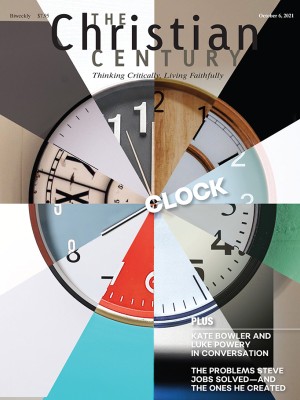An evangelical Christian argument for reparations
Duke Kwon and Gregory Thompson want to talk about theft.
In June, in the East Room of the White House, President Biden signed bipartisan legislation designating Juneteenth as a new federal holiday. In his remarks, he recalled the end of “the long, hard night of slavery,” the “original sin” that had left a lasting “moral stain” on the nation’s soul.
One word Biden did not use to speak about slavery and its consequences was theft. Unlike more generic conceptualizations of slavery’s impact, theft is a specific act that results in quantifiable imbalances. Theft cannot be made right by symbolic gestures like a federal holiday or a sign on the front lawn. It cannot be made right by feeling sorry. Theft requires tangible restitution.
Read our latest issue or browse back issues.
Duke Kwon and Gregory Thompson want to talk about theft. Theft, they argue, is the most appropriate descriptor of America’s racial history. It’s therefore the most relevant context for White Christians seeking a scriptural path toward racial healing. If we understand slavery to be a nebulous “moral stain” we have inherited, then the most theology can do is challenge White Christians to be less prejudiced than our ancestors. We will never genuinely repair the material or spiritual harm wrought by White supremacy unless we treat it as a theft that has yet to be made right.
Kwon and Thompson have given us a single volume that carefully walks readers through the historical record and its theological implications. The book is thoroughly researched, and the writing is lucid and concise. The first three chapters make the case that White supremacy is a real phenomenon and that its enduring effect has been “multigenerational theft.” Although this material can be found in other sources, this section is as comprehensive and well-written as any account I’ve read of the compounding debt of slavery and Jim Crow. It will be useful to readers of all backgrounds.
The book’s next section wades into more theological waters. Kwon and Thompson focus their historical analysis on the specific ways the White Protestant church has blessed and participated in this ongoing plunder of Black Americans. Then they make the case that Christians are called to pursue both restitution, exemplified by Zacchaeus repaying those he’d defrauded, and restoration, embodied by the Good Samaritan’s long-term commitment to the healing of a person he had not directly harmed.
Readers already familiar with this historical narrative and the case for reparations may bristle at certain limitations of the book’s scope. Reparations for other groups—such as Indigenous people—are not part of the discussion here. Nor do the authors attempt any intersectional analysis of gender as they tell the story of why power and wealth remain concentrated in certain people’s hands. For example, after relating an 1867 debate over the ordination of Black clergy in Virginia, they conclude, “obstructing a person’s ministerial calling on the basis of race is undoubtedly a form of ecclesial theft,” leaving one to wonder about the ongoing prohibition of female clergy in the authors’ own Presbyterian Church in America.
But the authors are not writing with more progressive readers in mind, and they are not interested in preaching to the already converted. As the furor over critical race theory has demonstrated, it is easier for a camel to go through the eye of a needle than for a self-assured White person to read the words White supremacy with an open mind. This is Kwon and Thompson’s ambitious project. By appealing to readers’ sense of biblical justice and divine obedience, and by keeping the work laser-focused on White supremacist theft, the authors make a strong case that reparations for Black Americans are not only justifiable, they are required by scripture.
Ultimately, Kwon and Thompson’s vision goes beyond monetary reparations. They want not only to close the racial wealth gap but to restore dignity and equity in every congregation, neighborhood, and workplace. This may be why they seem to prefer the word repair to the word reparations, especially toward the book’s end. Checks from the government would be good, but the authors desire a deeper societal transformation.
It’s a powerful, expansive vision. But it too quickly draws our attention away from wealth transfers and toward many other possibilities, most of which are in the realm of community development rather than reparations. After six chapters of persuasive groundwork, when it’s time to ask what we should do, it is disappointing that the authors do not give any examples of how denominations or congregations might undertake reparations locally. Nor do they encourage us to advocate for reparations from the federal government.
Why not challenge us with the example of Princeton Theological Seminary, which in 2016 began a historical audit of its own ties to slavery? The authors makes one mention of Princeton’s slavery report. Inexplicably, they relegate to an endnote the fact that, in 2019, the seminary set aside over $27 million from its endowment “as reparations for its historical ties to slavery.” The story of Princeton’s financial commitment—and its attendant reckonings with truth and power—would make a fitting (and much more compelling) final chapter to Kwon and Thompson’s book.
Still, I will be sharing this book with my students and colleagues. Reparations is a shining example of persuasive theological writing that blends rigorous historical research with biblical exegesis. Most importantly, the authors model what it looks like for non-Black Christians to take seriously Black trauma and Black testimony. This kind of engagement has the potential to stir the church to substantive action.







